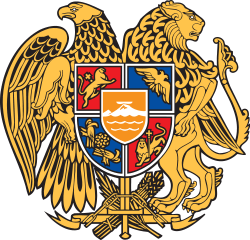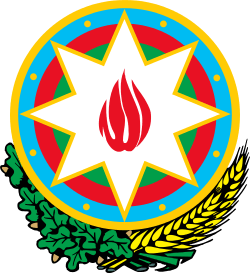Armenia–Azerbaijan relations
 |
|
Armenia |
Azerbaijan |
|---|---|
Armenia–Azerbaijan relations refers to the bilateral relationship of Armenia and Azerbaijan, as well as relations between the Armenian and the Azerbaijani societies. The neighboring nations had formal governmental relations between 1918 and 1921, during their brief independence from the collapsed Russian Empire, as the First Republic of Armenia and the Democratic Republic of Azerbaijan; these relations existed from the period after the Russian Revolution until they were occupied and annexed again by the successor state, the Soviet Union. Due to the two wars between the countries in the past century – one from 1918 to 1921 and another from 1988 to 1994 – their relations, or the lack thereof, have been shaped due to the conflict over the Nagorno-Karabakh region. There are no diplomatic relations between the two countries and they are still at war because of the ongoing Nagorno-Karabakh conflict and dispute.
History
Relations between 1918 and 1921
Upon the disintegration of the Transcaucasian Federation with the proclamation of the independent Democratic Republic of Georgia on May 26, 1918, both Azerbaijan and Armenia proclaimed their independence on the same day, May 28, 1918. Both Armenia and Azerbaijan laid claim to territory which they saw as historically and ethnically to be theirs, these territorial disputes led to the so-called Armenian–Azerbaijani War between 1918 and 1920, a series of conflicts that ended only when both Armenia and Azerbaijan were swallowed by the Soviet Union.
Soviet period (1922–91)
Upon the establishment of USSR in 1922, Azerbaijan SSR and Armenian SSR became constituent states, initially as a part of Transcaucasian SFSR, and from 1936 as separate entities. The relations between the two nations, including in Nagorno-Karabakh Autonomous Oblast (NKAO), were generally peaceful and friendly under the Soviet rule. Though occasional confrontations did occur, particularly the 1948 and the 1964 public protests in Armenia which resulted in exodus of a large number of Azeris, they remained unknown to a broader public due to strict Soviet censorship.
The two countries went to war in 1988 over the territory resulting in the de facto independence of the Nagorno-Karabakh region. The war ended in a ceasefire in 1994.
In 1988, the Armenians of Karabakh voted to secede and join Armenia. This, along with massacres in Azerbaijan resulted in the conflict that became known as the Nagorno-Karabakh War. The violence resulted in de facto Armenian control of former NKAO and seven surrounding Azerbaijani regions which was effectively halted when both sides agreed to observe a cease-fire which has been in effect since May 1994. In late 1995, both also agreed to mediation of the OSCE Minsk Group. The Minsk Group is currently co-chaired by the US, France, and Russia and comprises Armenia, Azerbaijan, Turkey, and several Western European nations.
After 1994
After the war, relations between Armenia and Azerbaijan remained very tense. In 2008, Azerbaijani president Ilham Aliyev declared that “Nagorno Karabakh will never be independent; the position is backed by international mediators as well; Armenia has to accept the reality” and that “in 1918, Yerevan was granted to the Armenians. It was a great mistake. The khanate of Iravan was the Azeri territory, the Armenians were guests here."[1]
The two countries are still technically at war and the Azerbaijani government regularly threatens to retake Nagorno-Karabakh by military force, if mediation of the OSCE Minsk Group does not succeed.[2]
Citizens of the Republic of Armenia, as well as citizens of any other country who are of Armenian descent, are forbidden entry to the Republic of Azerbaijan. If a person's passport shows any evidence of travel to Nagorno-Karabakh, barring a diplomatic passport, they are forbidden entry to the Republic of Azerbaijan.[3][4]
In 2008, in what became known as the 2008 Mardakert Skirmishes, Armenia and Azerbaijan clashed over Nagorno-Karabakh. The fighting between the two sides was brief, with few casualties on either side.[1]
June 2010 saw a brief flare up of the conflict, resulting in the deaths of four Armenian soldiers and one Azeri soldier. The clash came a day after peace talks between the Presidents of Armenia and Azerbaijan which were held in Moscow.[5]
On August 31, 2010, a border clash killed three Armenians and two Azeris, although the Armenian military claimed up to seven Azeris had been killed in the fighting. Both sides blamed the other for the incident.[6] This preceded another incident on September 4 in which two Azerbaijani soldiers were killed and one Armenian wounded.[7]
On June 24, 2011, the two sides met in Kazan, Russia, to negotiate an end to the Nagorno-Karabakh issue, but the talks ended in failure. Following the breakdown of talks, the Azeri President Ilham Aliyev used the June 26 Salvation Day military parade to warn Armenia that Azerbaijan may retake Nagorno-Karabakh by force.[8] On 5 October 2011, border clashes around Nagorno Karabakh left one Armenian soldier and two Azeris dead. Two Armenians were also wounded by sniper fire the same day.[9] Another violent incident occurred on 5 June 2012 when, according to the Azerbaijani side, Armenian troops crossed the border and shot dead five Azerbaijani soldiers before withdrawing. Armenia denied the claim and accused Azerbaijan of crossing the border first.[10]
In October 2013, Zakir Hasanov was appointed as Azerbaijani Defence Minister despite controversy.
2016 clashes
After the 2016 Armenian–Azerbaijani clashes, in which an estimated 350 troops and civilians from both sides were killed, Azerbaijan declared a unilateral cease fire (The clashes started when Azerbaijani forces launched strikes to regain control of territory controlled by the Armenia-backed breakaway Nagorno-Karabakh).[11][12]
See also
References
- 1 2 Azerbaijani president: Armenians are guests in Yerevan, REGNUM News Agency, January 17, 2008
- ↑ "Azerbaijan military threat to Armenia." The Daily Telegraph. November 22, 2009. Retrieved November 23, 2009.
- ↑ Azerbaijan Country Page. NCSJ: Advocates on Behalf of Jews in Russia, Ukraine, the Baltic States & Eurasia. Accessed 23 May 2010.
- ↑ Azerbaijan doesn't allow Armenians in the country - Panarmenian.net
- ↑ "Four Armenians and one Azeri killed in Karabakh clash". Reuters. 2010-06-19. Retrieved 2012-09-03.
- ↑ "BBC News - Several killed in Nagorno-Karabakh clash". Bbc.co.uk. 2010-09-01. Retrieved 2012-09-03.
- ↑ "PressTV - Karabakh clashes leave 2 soldiers killed". Presstv.ir. 2010-09-05. Retrieved 2012-09-03.
- ↑ "Armenia, Azerbaijan fail to reach agreement on Nagorny Karabakh | World | RIA Novosti". En.rian.ru. 2012-04-09. Retrieved 2012-09-03.
- ↑ "News from Armenia, Events in Armenia, Travel and Entertainment | Armenia, Azerbaijan Report More Deadly Skirmishes". ArmeniaDiaspora.com. 2011-10-06. Retrieved 2012-09-03.
- ↑ "BBC News - Armenian forces kill five Azerbaijani troops on border". Bbc.co.uk. 2012-06-05. Retrieved 2012-09-03.
- ↑ "Nagorno-Karabakh fighting: Azerbaijan 'calls truce'" (bbc.com). BBC. BBC. 3 April 2016. Retrieved 3 April 2016.
- ↑ Botelho, Greg; Tuysuz, Gul; Berlinger, Joshua (3 April 2016). "Azerbaijan declares unilateral ceasefire amid Nagorno-Karabakh violence" (CNN Online). Retrieved 3 April 2016.
Further reading
- Sauerborn, Djan; Scianna, Bastian Matteo; Mazziotti, Marius: "Multipolarity is key: Assessing Azerbaijan's foreign policy"

